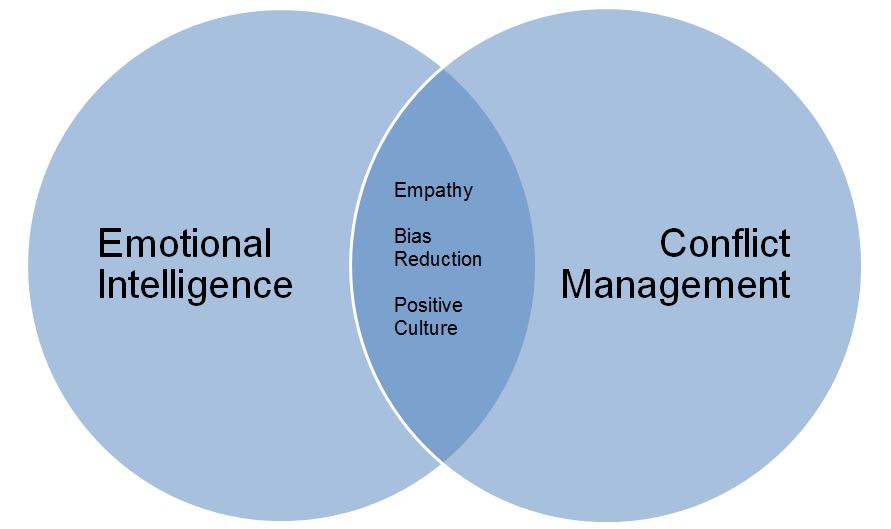Introduction
Conflict management is an essential competence of a modern-day team leader of the U.S. Army. Emotional intelligence (EI) is a vital part of conflict management in the military setting. According to the Department of the Army (2015), successful resolution of the tension between individuals or groups requires meeting several conditions. Firstly, an army team leader must understand both sides’ positions. Secondly, a leader must stay unbiased throughout the conflict management process. Lastly, a leader must find a way to prevent negativity, such as personal attacks and heated outbursts (Department of the Army, 2015). An army leader can be a tactical genius but cause damage to their team due to the lack of the necessary emotional skills (Stuewe, 2018). In this regard, EI acts as a powerful facilitator of beneficial attitudes that enable effective conflict management.
Empathy in Conflict Management
Most importantly, EI is directly related to empathy, a leader’s ability to understand others’ perspectives. Optimal conflict management considers the positions of both sides (Department of the Army, 2015). An insufficient EI level results in a lack of empathy. An unempathetic leader may slip into toxic leadership, losing the ability to communicate effectively with their team (Stuewe, 2018). Consequently, a leader may fail to grasp the perspectives of conflicting parties. Therefore, the lack of understanding on the leaders’ part would logically lead to mutual dissatisfaction. As a result, a leader may lose the respect of their subordinates and fail to organize a proper conflict management effort. Such a situation would likely disrupt the team, making it ineffective in attaining its goals. The conflict would remain unresolved and continue to undermine the team’s performance. In this regard, successful conflict management highly depends on the leader’s EI. A leader with well-developed emotional skills is more likely to understand the essence of the conflict and the parties positions. Their empathy would serve as a stepping stone for reaching the potential consensus. In the end, an empathetic leader is more likely to address conflicting perceptions.
Reduction of Bias and Stereotyping
Secondly, EI improves the chance of bias and negative stereotyping reduction. This benefit is especially important in task conflicts referring to disagreements about work. Bias and stereotyping may prevent the teams from taking each other seriously and moving toward the common goal. A leader with a higher EI level would likely find a way to eliminate bias and see a clearer picture. In contrast, low EI would result in a leader’s inability to cooperate with an opposing side to resolve the conflict. DiBenigno (2018) conducted a field study of four U.S. Army brigades that had to work with civilian mental health providers. Commanders aimed to field a mission-ready force, while mental health providers were tasked with providing rehabilitative care to soldiers (DiBenigno, 2018). Initially, the Army team leaders dismissed mental health providers as anti-military “Berkeley hippies” who “coddle soldiers” (DiBenigno, 2018). However, the leadership of the two brigades managed to reduce the bias through regular dialogue (DiBenigno, 2018). The emotional skills of those leaders helped them overcome the counterproductive mistrust. As a result, they managed to improve their troops’ mission readiness by using the knowledge and skills of civilian mental health providers.
Positive Workplace Culture
Finally, mastery of emotional skills allows a team leader to establish a positive workplace culture in a military setting. According to Oden et al. (2015), high levels of emotional intelligence are related to such positive outcomes as improved decision-making and the establishment of positive interpersonal relationships. A competent leader may utilize these benefits to develop a constructive solution to potential conflicts. Furthermore, the leader may use a favorable climate to prevent heated outbursts and personal attacks. As such, a vital condition for proper conflict management would be fulfilled. In addition, EI assists individuals in leading collaborative and mission-focused activities (Oden et al., 2015). In this regard, EI facilitates conflict management by helping team members express their concerns civilly. A positive culture allows a team leader to avoid arguments and prevent unprofessional conduct. Consequently, the conflict stays under control and gradually moves toward an optimal resolution. In the end, a leader provides subordinates with the necessary freedom to resolve disagreements. A healthy professional environment helps the leader relieve tension before it causes significant damage to team performance.
Conclusion
In conclusion, one can state that conflict management skills are essential for an army leader. A competent leader can resolve interpersonal disagreements before they cause harm and get positive results from task conflicts. The leader’s emotional intelligence is crucial for meeting the essential requirements for successful conflict management. EI directly affects the leader’s empathy and ability to reduce bias and create positive workplace culture. As a result, the conflict management effort becomes positively affected (Appendix A). Tactical success will be short-lived if an army leader does not have competence in conflict management. Eventually, teams led by such individuals may become plagued by poorly addressed conflicts and lose the sense of their mission. In the end, the activities of such teams may become detrimental to the cause of the U.S. Army.
References
Department of the Army. (2015). Army team building. Web.
DiBenigno, J. (2018). Anchored personalization in managing goal conflict between professional groups: The case of US Army mental health care. Administrative Science Quarterly, 63(3), 526-569.
Oden, K. B., Lohani, M., McCoy, M., Crutchfield, J., & Rivers, S. (2015). Embedding emotional intelligence into military training contexts. Procedia Manufacturing, 3, 4052-4059.
Stuewe, D. R. (2018). Lack of emotional intelligence as a factor in the relief of US Army commanders. US Army Command and General Staff College Fort Leavenworth United States.
Appendix A
Graphic Organizer: Beneficial Effects of Emotional Intelligence
